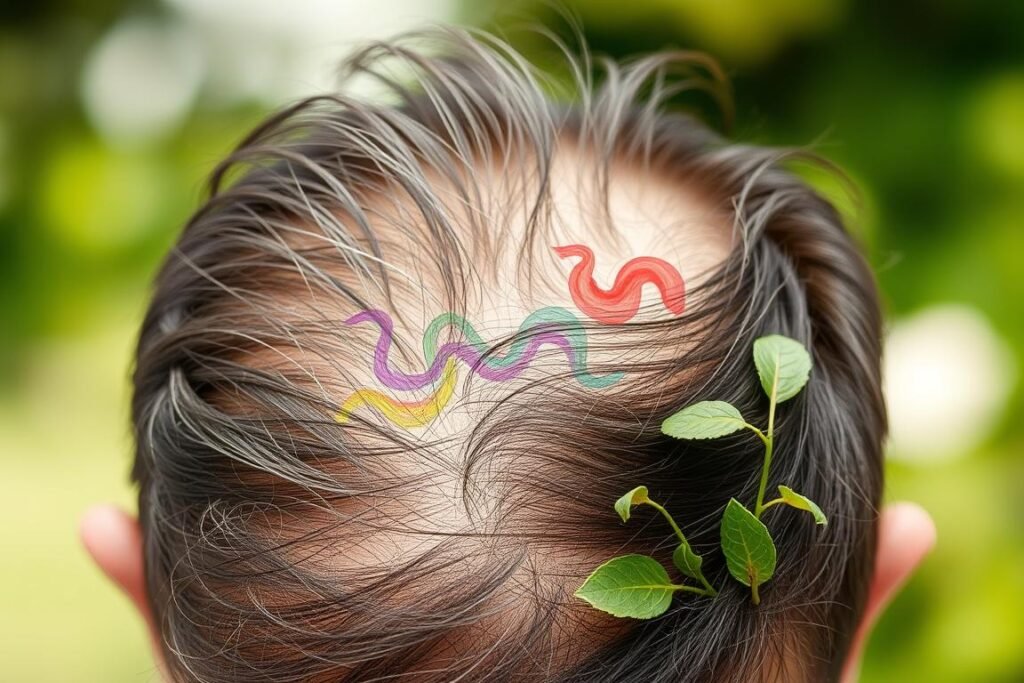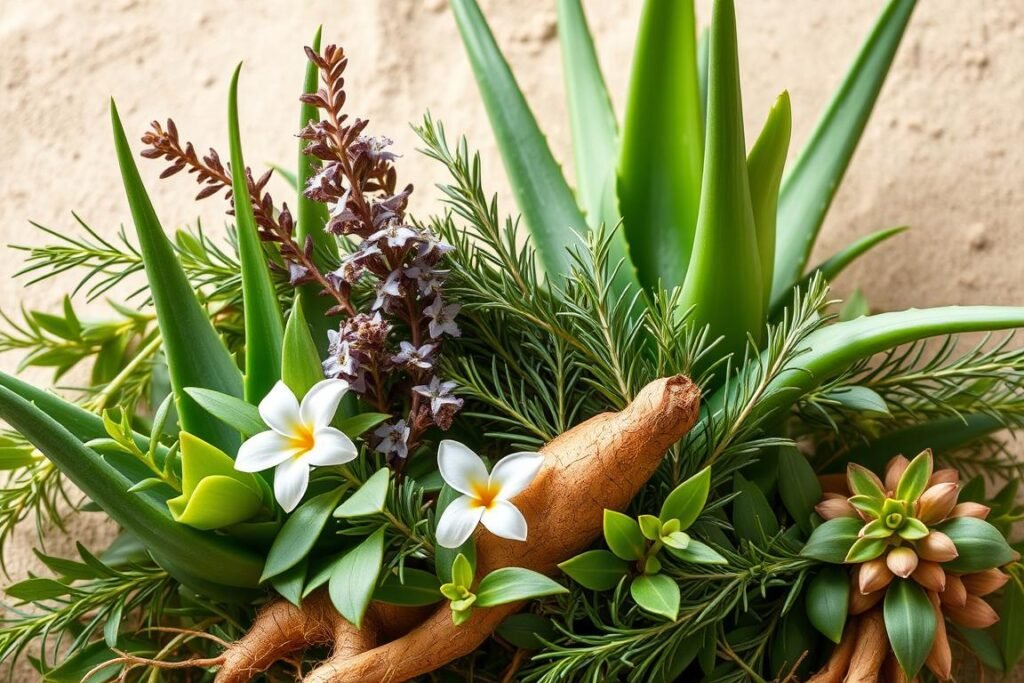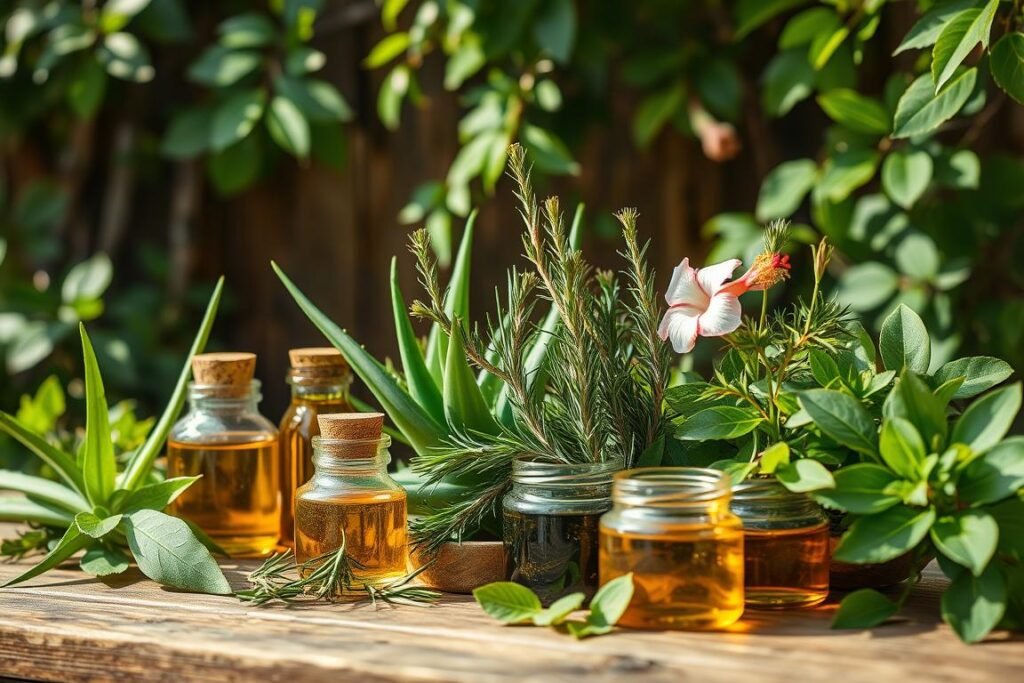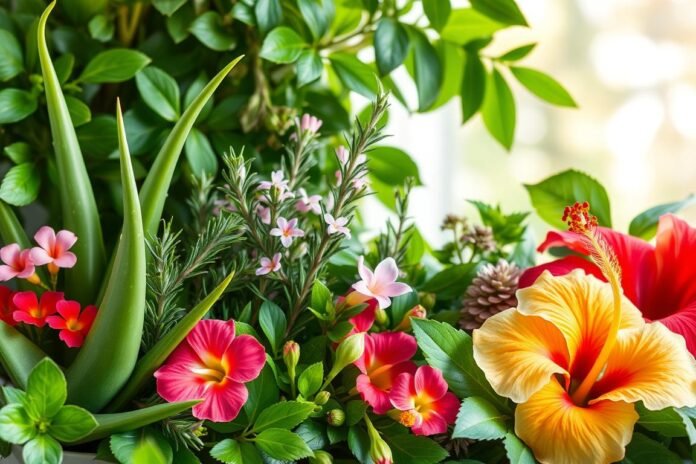If you want to grow your hair naturally, plant-based solutions are the way to go. Research shows that some herbs can slow down hair loss and boost new growth. This makes them a great choice for natural hair care.
While more studies are needed, herbs have been used in beauty and hair care for a long time. They might help your hair grow back stronger and healthier.
Some plants can help your hair grow by blocking harmful hormones and reducing scalp inflammation. Using herbal creams, serums, or hair masks can be a safe and effective way to care for your hair. Massaging these products into your scalp can make them even more effective.
In the next sections, we’ll look at the best plants for hair growth. We’ll talk about how to add them to your hair care routine. Natural plants can nourish your hair follicles, improve scalp health, and reduce side effects. Whether you use herbal oils, creams, supplements, or eat them, these solutions can help your hair reach its full potential.
Key Takeaways:
- Certain herbs have shown promise in slowing hair loss and promoting new growth
- Plants can support hair growth by blocking hair loss-related enzymes and reducing scalp inflammation
- Topical application of herbal creams, serums, or masks can safely stimulate hair follicles
- Massaging plant-based hair products into the scalp enhances their benefits
- Incorporating hair-growth plants through oils, creams, supplements, or diet may lead to healthier hair
Understanding Hair Loss and Its Causes
Hair loss, or alopecia, is a common worry for many. Losing some hair is normal, but too much can be a sign of a health problem. Knowing what causes hair loss can help you find the right treatment.
Common Reasons for Hair Loss
Many things can lead to hair loss, from genes to diet. Here are some common reasons:
- Hereditary factors, like male or female pattern baldness
- Hormonal changes, especially in women during menopause or pregnancy
- Lack of important vitamins and minerals, like iron, zinc, and biotin
- Some medicines, like those for cancer, arthritis, or depression
- Stress, which can cause temporary hair loss
- Autoimmune disorders, like alopecia areata, that attack hair follicles
- Harsh hair treatments, like too much heat styling or tight hairstyles

A study in the Journal shows iron deficiency is linked to hair loss. It found that fixing these deficiencies can help hair grow back and stop thinning.
Identifying the Type of Hair Loss
Hair loss can be scarring or non-scarring. Scarring hair loss is permanent and caused by damage to hair follicles. It can happen due to:
- Certain skin conditions, like discoid lupus erythematosus or lichen planopilaris
- Injuries or burns to the scalp
- Infections, such as folliculitis or ringworm
- Radiation therapy for cancer treatment
Non-scarring hair loss is more common and often temporary. It includes:
| Type of Hair Loss | Description |
|---|---|
| Androgenetic Alopecia | Also known as male-pattern or female-pattern baldness, this type of hair loss is caused by a combination of genetic and hormonal factors. It typically presents as a receding hairline or thinning on the crown of the head. |
| Telogen Effluvium | This type of hair loss occurs when a significant number of hair follicles enter the resting phase (telogen) prematurely, leading to diffuse hair shedding. It can be triggered by stress, hormonal changes, or nutritional deficiencies. |
| Alopecia Areata | An autoimmune disorder that causes patchy hair loss on the scalp and other parts of the body. It occurs when the immune system mistakenly attacks hair follicles, leading to sudden hair loss. |
Knowing the type and cause of your hair loss helps you find the right treatment. This might include fixing health issues, changing your lifestyle, or using products with natural ingredients like aloe vera, rosemary, or ginseng.
The Benefits of Using Natural Plants for Hair Growth
Natural plants are great for growing healthy hair. They nourish your hair follicles and improve scalp health. This makes your hair thicker, fuller, and more vibrant.
Nourishing Hair Follicles
Using natural plants helps nourish hair follicles. Herbs like horsetail are full of silica, which strengthens hair. This makes hair thicker and more resilient, helping to reduce hair loss.
Aloe vera gel is also beneficial. It treats alopecia areata when used with finasteride and oregano oil. These natural remedies provide essential nutrients and stimulate hair growth.

Promoting Scalp Health
A healthy scalp is key for growing hair. Natural plants like coconut oil are rich in biotin, which promotes scalp health. Regular scalp massages with natural oils also improve hair thickness.
These massages alter gene expression and stress cells. Keeping the scalp nourished and moisturized creates a great environment for hair growth.
Minimizing Side Effects
Natural plant-based remedies have fewer side effects than conventional treatments. They are gentler and promote healthier hair growth. This avoids irritation and dryness caused by synthetic products.
Choosing natural solutions means healthier, more beautiful hair with less risk of complications. Nature offers a powerful way to achieve great hair.
| Natural Plant | Benefits for Hair Growth |
|---|---|
| Horsetail | Rich in silica, strengthens hair shaft, increases hair thickness |
| Aloe Vera | Treats alopecia areata, nourishes hair follicles |
| Coconut Oil | Contains biotin, promotes scalp health, encourages hair growth |
| Scalp Massage | Improves hair thickness, alters gene expression, transmits mechanical stress to cells |
Adding natural plants to your hair care routine offers many benefits. They nourish hair follicles, promote scalp health, and reduce side effects. These natural solutions provide a holistic approach to achieving healthier, thicker, and more vibrant hair.
Top Plants for Hair Growth
Looking for natural ways to grow your hair? Several plants can help. They gently nourish your hair follicles and support growth. Let’s look at some top plants for hair growth.
Aloe Vera
Aloe vera is known for its hair growth benefits. It has nutrients and enzymes that nourish the scalp and hair follicles. Using aloe vera gel can help grow hair, especially with finasteride and oregano oil.
A study showed aloe ferox gel with these ingredients treats alopecia areata. This condition causes patchy hair loss.
Rosemary
Rosemary oil is a popular natural hair treatment. It improves hair thickness and density. A study compared rosemary oil and minoxidil and found both increase hair count after six months.
This makes rosemary oil a good natural choice for managing androgenetic alopecia. It’s a common hair loss condition.

Ginseng
Ginseng is a traditional medicine that may help hair follicle health. It has phytochemicals that promote hair growth. Research shows ginseng prevents hair loss by stopping cell death and stimulating growth.
Adding ginseng to your hair care routine may fight hair loss. It can lead to healthier, fuller hair.
Pumpkin Seed Oil
Pumpkin seed oil is a natural hair regrowth treatment. A study found it increases hair count in women with hair loss. It’s as effective as minoxidil in growing hair.
This oil is rich in essential fatty acids and nutrients. It nourishes the scalp and supports hair growth.
Green Tea
Green tea is good for your health and hair. A study found it increases hair density and thickness. The antioxidants in green tea improve scalp health and promote stronger hair.
| Plant | Benefits for Hair | Key Ingredients |
|---|---|---|
| Aloe Vera | Stimulates hair regrowth, nourishes hair follicles | Aloe vera gel, finasteride, oregano oil |
| Rosemary | Improves hair thickness and density | Rosemary oil |
| Ginseng | Prevents hair loss, stimulates hair growth | Ginseng phytochemicals |
| Pumpkin Seed Oil | Increases hair regrowth and thickness | Essential fatty acids, nutrients |
| Green Tea | Improves hair density and diameter | Antioxidants, green tea compounds |
Using these plants in your hair care routine can help your hair grow. They can be used as treatments, supplements, or with other natural ingredients. These plants are a natural way to improve hair growth and fight hair loss.
Herbal Remedies for Hair Growth
Herbal remedies are a gentle way to promote hair growth naturally. They include herbal hair oils, topical treatments, and oral supplements. These plant-based solutions nourish hair from the inside and out.
Herbal Hair Oils
Herbal hair oils, or hair tonics, mix herbal extracts with carrier oils. Carrier oils like coconut or jojoba oil are used. These blends nourish hair follicles and promote scalp health.
- Chinese hibiscus
- Brahmi
- Coat buttons
- Jatamansi
- Ginseng
These herbs stimulate hair follicles and increase follicle size. Massaging your scalp with these oils improves blood circulation. It delivers nutrients to the hair roots, supporting growth.
Herbal Creams and Ointments
Herbal creams and ointments are great for topical treatments. They mix herb-infused oils with ingredients like beeswax. This creates a nourishing treatment for the scalp and hair.
- Gooseberry
- Gotu kola
- Aloe vera
- Holy basil
These herbs condition the scalp and prevent hair loss. Regular use keeps hair follicles nourished. It creates a healthy environment for growth.
Herbal Supplements
Herbal supplements support hair growth from within. They provide essential nutrients for healthy hair. Some effective supplements include:
- Viviscal: It has vitamins, minerals, and marine extracts for hair growth.
- Saw Palmetto: It reduces hair fallout and increases density.
“I’ve been using herbal supplements for hair growth for the past few months, and I’ve noticed a significant improvement in the thickness and overall health of my hair.” – Sarah, Los Angeles
Choose high-quality herbal supplements from reputable brands. Follow the dosage instructions. Always consult a healthcare professional before starting any new supplement.
| Herbal Remedy | Benefits |
|---|---|
| Herbal Hair Oils | Nourish hair follicles, promote scalp health, encourage hair growth |
| Herbal Creams and Ointments | Condition the scalp, prevent hair loss, promote healthy hair growth |
| Herbal Supplements | Provide essential nutrients and compounds for healthy hair growth from within |
Herbal remedies can support healthy hair growth. Use herbal hair oils, creams, ointments, or supplements. These natural solutions promote luscious, healthy hair.
Incorporating Plants into Your Hair Care Routine
Adding natural plants to your hair care routine is easy and effective. It helps your hair grow healthy. Use plant-based products and DIY treatments to nourish your scalp and hair.
Herbal hair oils, creams, or masks are great for adding plants to your routine. Apply them to your scalp and hair for nutrients and moisture. Look for products with aloe vera, coconut oil, and essential oils.
Try making your own hair treatments with natural ingredients. Here are some easy recipes:
- Aloe Vera and Coconut Oil Hair Mask: Mix equal parts aloe vera gel and coconut oil. Apply to your hair and scalp, leave on for 30 minutes, then rinse thoroughly.
- Rosemary and Peppermint Scalp Massage Oil: Mix a carrier oil like jojoba or argan oil with rosemary and peppermint essential oils. Massage into your scalp to stimulate blood flow and promote healthy hair growth.
- Green Tea and Apple Cider Vinegar Rinse: Steep green tea bags in hot water, let cool, then mix with equal parts apple cider vinegar. Use as a final rinse after shampooing to clarify your scalp and boost shine.
When buying plant-based hair products, choose brands that use natural and organic ingredients. Look for ingredients like:
| Ingredient | Benefits |
|---|---|
| Green Tea | Rich in antioxidants, helps block DHT (a hormone linked to hair loss), promotes scalp health |
| Ginseng | Stimulates hair follicles, improves circulation, promotes growth |
| Pumpkin Seed Oil | Contains zinc and essential fatty acids, helps block DHT, nourishes hair |
Using natural ingredients and DIY treatments in your hair care routine nourishes your hair. It makes your hair strong, healthy, and beautiful. This way, you avoid harsh chemicals that can harm your hair and scalp.
“The best hair care is natural hair care. By using plant-based products and ingredients, you can give your hair the nutrients it needs to thrive, without exposing it to potentially harmful chemicals.” – Dr. Sarah Thompson, Naturopathic Physician
Lifestyle Changes to Support Healthy Hair Growth
Using natural plants for hair growth is just the start. Making lifestyle changes can also boost your hair’s health. Focus on a nutritious diet, manage stress, and use gentle hair care to support hair growth.
Nutritious Diet
Your diet greatly affects your hair’s health. Eat a balanced diet with foods that are good for your hair. Include protein-rich foods like eggs, lean meats, fish, nuts, and seeds. They help your hair grow strong.
Also, add fruits and vegetables to your diet. They give your hair vitamins A, C, and E. These vitamins help your hair grow healthy.
Consider taking supplements for hair growth. Biotin, a B-vitamin, strengthens hair. Iron and omega-3 fatty acids nourish hair follicles and prevent loss.
Stress Management
Stress can cause hair loss and thinning. High stress levels disrupt hair growth. It’s important to manage stress to keep your hair healthy.
Try relaxation techniques like deep breathing, meditation, or yoga. These practices reduce stress and promote calm. Enjoy activities that relax you, like exercise or hobbies, to improve your well-being.
Gentle Hair Care Practices
How you care for your hair daily affects its health. Use gentle practices to avoid damage and breakage.
Avoid using too much heat styling. Tools like flat irons and blow dryers can damage your hair. If you must use heat, apply a heat protectant spray and keep the temperature low.
Chemical treatments like bleaching can weaken your hair. If you must get these treatments, do so sparingly and with a professional stylist to minimize damage.
When detangling your hair, be gentle and patient. Use a wide-toothed comb or a soft-bristled brush, starting from the ends and working your way up to the roots. Avoid pulling or tugging on your hair, as this can cause breakage and damage to the hair shafts.
By making these lifestyle changes, you can create a great environment for hair growth. Remember, consistency is key. Be patient and persistent in your efforts to support your hair’s health.
When to Seek Professional Help for Hair Loss
Natural plants can help with hair growth and mild hair loss. But, sometimes you need professional help. If you have severe or sudden hair loss, see a dermatologist or trichologist. They can give you a proper evaluation and hair loss treatment.
Severe or Sudden Hair Loss
Excessive hair shedding might need professional help. If you lose more than 100 strands a day or see bald spots, get expert advice. A dermatologist can find the cause and suggest treatments like medicines or surgery.
Underlying Medical Conditions
Sometimes, hair loss is a sign of a health issue. Thyroid problems, autoimmune diseases, and nutritional deficiencies can cause it. If you think your hair loss is due to a health problem, see your doctor. They can diagnose and treat the issue, helping your hair grow back.
“Hair loss can be a distressing experience, but it’s important to remember that there are effective treatments available. Seeking professional help from a dermatologist or trichologist can provide you with the guidance and support you need to address your hair loss concerns and restore your confidence.” – Dr. Emily Parker, Dermatologist
Early action is crucial for hair loss. Getting professional help quickly can help you manage your hair loss. Don’t wait to see a healthcare professional if you have severe or sudden hair loss or think it might be due to a health issue.
Conclusion
We’ve looked into natural ways to help hair grow stronger and fuller. Understanding why hair falls out and the good of natural plants helps. You can now take steps to make your hair healthier and look better.
Using herbs like aloe vera, rosemary, and ginseng can help your hair. They nourish the scalp and reduce harm from harsh chemicals. You can use herbal oils, creams, or supplements to support your hair’s growth.
It’s also key to care for your hair in a holistic way. Eat well, manage stress, and be gentle with your hair. These steps, along with natural remedies, help your hair grow well.
But, if your hair loss is severe or sudden, see a doctor. They can find the cause and suggest the right treatment. This is especially true if you think there’s a medical issue.
